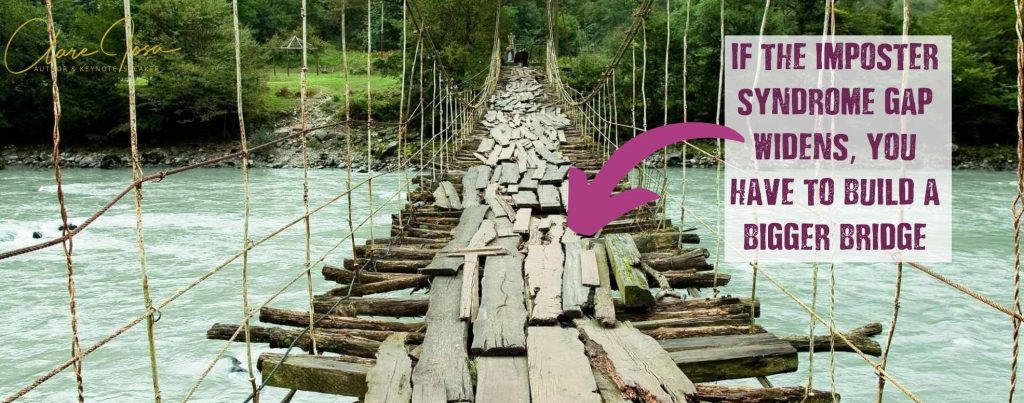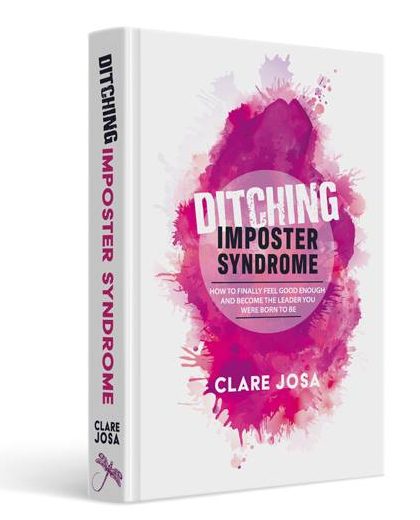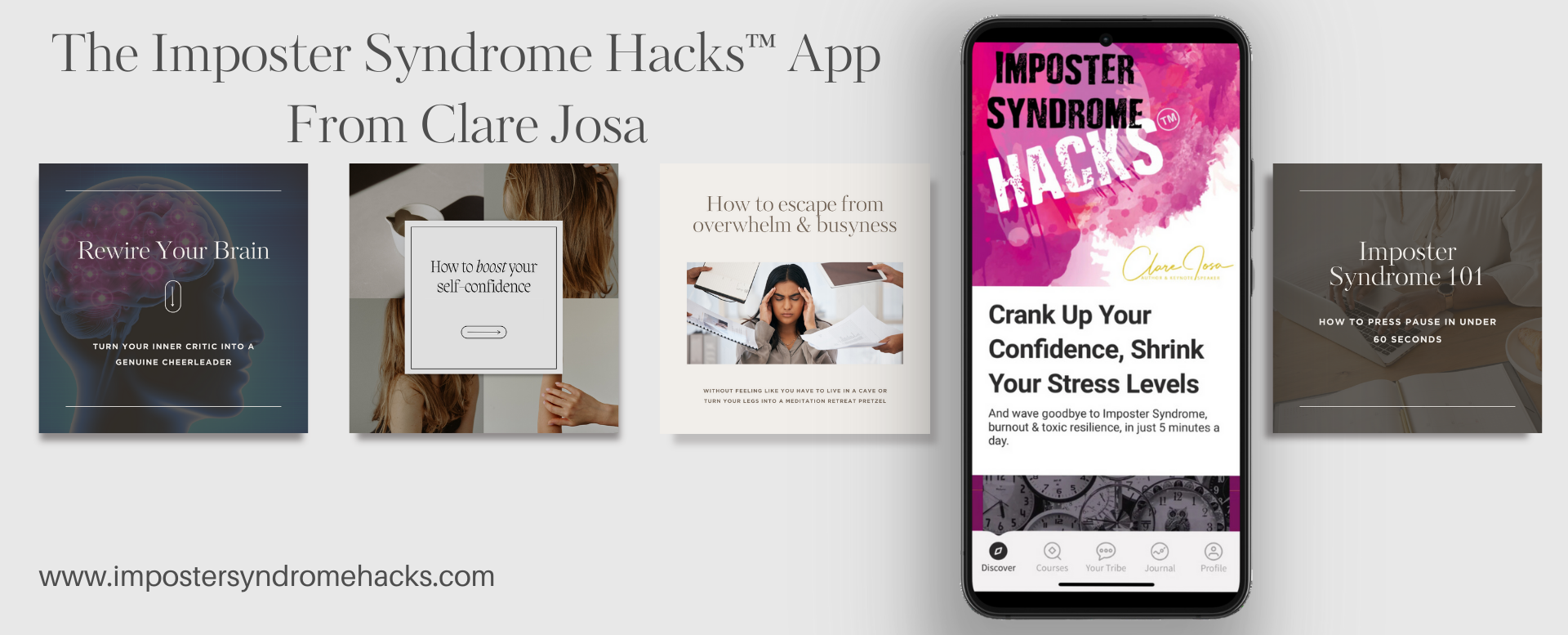Is it time to stop building the Imposter Syndrome bridge of coping strategies?
I'm curious: if your boiler broke down, which would you prefer?
Let's imagine it's the depths of winter and your boiler has broken down. The house is cold. Your nose feels like an ice cube. You're typing gobbledygook in two layers of gloves. And there are only so many jumpers you can wear without feeling like Joey on the wear-all-my-clothes-at-once episode of Friends.
You achieve the miracle of getting a plumber to come round. Two, in fact.
Plumber number one offers to teach you how to spot when your boiler might be about to break down in future - the early warning signs - and ways to bodge it, to get it back working again. But they don't know how to fix it, permanently.
Plumber number two can carry out work that means your boiler will never have this problem again and will be generally more robust, but after they get it back up and running today, that might take one or two more visits.
Which do you choose?
Winter after winter, worrying that you've got to keep listening for those clank-and-creak warning signs, to drag out the folder of boiler-bodge strategies as you shiver in your Joey-jumpers? Or putting in a little more effort so that you can relax and trust your boiler to be there for you, right when you need it, pretty much forgetting about it, apart from annual servicing?
The Imposter Syndrome Bridge Of Coping Strategies
In Ditching Imposter Syndrome, I talk about Imposter Syndrome being the gap between who we see ourselves as being, and who we think we need to be, in order to achieve our goals.
When we're in alignment with who we really are, the gap can disappear - we see ourselves as already being the kind of person who achieves that goal. But if we need to stretch a comfort zone or step up for a promotion, or have a major life-changing event like an international pandemic, that gap can widen. And it can feel like a ravine.
Sometimes that ravine - the Imposter Syndrome Gap - makes us hold back from taking action completely. Sometimes we have to cross it, so we build ourselves a bridge of coping strategies. We walk across it, tentatively, trying not to look down, hoping it will take us to the other side.
The problem with this is that coping strategies are like sticky plasters (Band Aids, for my American friends). And sticky plasters eventually fall off.
And relying on the Imposter Syndrome bridge of coping strategies is a high-risk option. It leads to a very reactive way of living, where we're giving all of our personal power to the secret fear of being found out as 'not good enough':
The 'coping' way of living leaves us constantly in fear that our secret 3am self-talk will strike again. And it makes us hold back from stepping up to those exciting opportunities to prove ourselves, to be visible, and to fulfil our potential.
The other fatal flaw with this plan is that most of the early warning signs for Imposter Syndrome are subconscious, especially when we're stressed. So it's far too easy for our first sign that it has struck to be the very self-sabotage that our coping strategies were hoping to prevent - the proverbial boiler breaking down, yet again.
But there's another, even bigger issue.

The other problem with the Imposter Syndrome Bridge Of Coping Strategies comes when we need to go for a stretch goal, or get promoted, or be more visible, or experience some other event that requires us to stretch and grow:
The Imposter Syndrome Gap - that ravine - widens.
So we have to work like crazy-things to build a wider bridge.
That takes effort, headspace, and time. And while we're doing that, the self-sabotage inner trolls in the ravine are throwing a massive party.
Frankly, walking over the Imposter Syndrome bridge of coping strategies can feel pretty scary!
Why Is The Imposter Syndrome Bridge Of Coping Strategies So Popular?
Most of what is out there on helping people with Imposter Syndrome is built on a myth:
Major myth: Imposter Syndrome is incurable.
It isn't. It's just that people are applying the wrong strategies to clear out the causes, or don't have the right tools. [Want to become a Certified Imposter Syndrome Mentor? And if you want to work with one, get in touch here.]
Because of this, most coaches, consultants and internet-article-authors are only able to teach coping strategies, because they have never actually cleared out Imposter Syndrome for themselves. And the unconscious mind won't let them take a client to a place it secretly believes is impossible.
You can spot this because they'll use words like 'mitigate' and 'cope' and 'handle' and 'deal with', rather than 'set yourself free from' or 'clear out'.
Also, classic coaching, as proven by the 2019 Imposter Syndrome Research Study, doesn't deal with the root causes of Imposter Syndrome, just the surface-level symptoms, the effects, which inadvertently perpetuates the 'incurable' myth. Most coaching qualifications don't equip coaches to work at the deepest identity levels, which is where Imposter Syndrome hangs out. Instead, they focus at the 'mindset' level, which is enough to 'cope' with it, but isn't enough to clear it.
Research study respondents reported that when they had classic coaching, it raised awareness of the early warning signs of Imposter Syndrome, but didn't allow them to prevent it - just to cope with it.
In many ways, they said classic coaching made Imposter Syndrome worse, because they became hyper-aware of when a bout of Imposter Syndrome was coming, but couldn't prevent it. So they felt like even more of a fraud and failure.
I've got a masterclass on this coming up soon, if you want to learn more about what the research says about this - and what we need to be doing differently:
imposter syndrome masterclass with clare josa
Three Super-Common Support Strategies That Could Be Making Imposter Syndrome Worse During Lockdown
What every coach, mentor and line manager needs to know.
The Imposter Syndrome bridge of coping strategies can be useful - it's like the emergency repair to your boiler, while the plumber does the real work that will make your boiler more robust, so you don't have to worry about it all the time.
The real work to clear out Imposter Syndrome - to finally set yourself free from it - is easier than you might think, once you stop spending so much energy on the surface-level symptoms and coping strategies, and instead identify the root cause triggers. Once you clear those out (in ways that are healthy and empowering), you no longer need the bridge of coping strategies.
You're free from all of that stress and worry - and you get to become the leader you were born to be, making the difference you are really here to make in the world.
A useful first step is to learn about the Imposter Syndrome Iceberg, there's an overview of it here. It explains why 'mindset' isn't enough to handle Imposter Syndrome - and how to spot the difference between it and self-doubt or just an overactive inner critic.
If you've already got my book - Ditching Imposter Syndrome - you'll find a whole chapter on it - and why it's so important - staring on page 40. If you've got the eBook version, search for "The Imposter Syndrome Iceberg".
And if you want to dive in and make a start on setting yourself free from Imposter Syndrome, once and for all (no more sticky plasters or scary ravine-crossing bridge of coping strategies!) there are three get-started-now options, below.
I'd love to get to walk by your side and guide you on your journey.
x Clare
Start Ditching Imposter Syndrome Today


